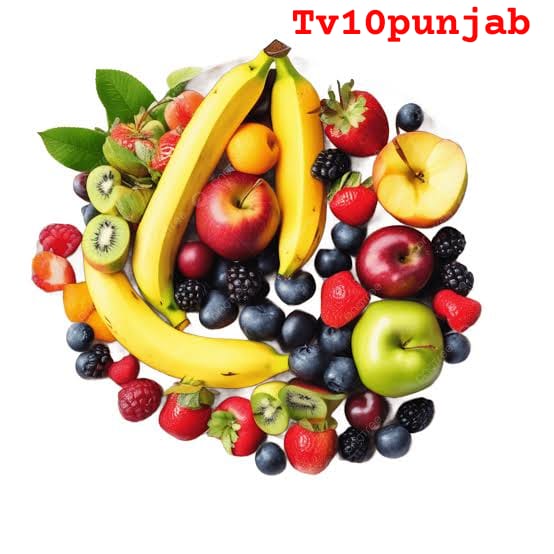With Nutritional Value and Health Benefits
Health Desk | Tv10punjab
The rainy season is a time when our body becomes more sensitive to infections, poor digestion, and low immunity. That’s why we need to eat fruits that are rich in nutrients and antioxidants. Some of the best fruits to eat during this season are Litchi, Jamun (Indian Blackberry), Cherries, and Plums. These fruits are tasty, full of health benefits, and give strength to the body.

In this article, we will understand each fruit in detail — their health benefits and nutritional values per 100 grams.

🍈 1. Litchi (Lychee)
Litchi is a sweet and juicy fruit with a soft white pulp inside a rough red skin. It is rich in Vitamin C and water content, which keeps the body cool and hydrated.
🔍 Nutritional Value (per 100g of Litchi):
Calories: 66 kcal
Carbohydrates: 16.5 g
Sugars: 15.2 g
Fiber: 1.3 g
Protein: 0.8 g
Fat: 0.4 g
Vitamin C: 71.5 mg (119% of daily need)
Potassium: 171 mg
Copper: 0.15 mg
✅ Health Benefits:
Boosts Immunity: High Vitamin C content helps fight infections and supports the immune system.
Hydration: Due to high water content, it keeps the body cool and hydrated during humid weather.
Skin Health: Antioxidants in litchi slow down aging and promote glowing skin.
Good for Digestion: Contains fiber which supports digestion and avoids constipation.
⚠️ Caution:
Do not eat unripe or overripe litchis.
Avoid eating on an empty stomach in large quantities.
🍇 2. Jamun (Indian Blackberry)
Jamun is a purple-black fruit with a juicy texture and slightly sour-sweet taste. It is a traditional Indian fruit known for its medicinal benefits, especially for people with diabetes.
🔍 Nutritional Value (per 100g of Jamun):
Calories: 62 kcal
Carbohydrates: 14 g
Sugars: 9.5 g
Fiber: 0.9 g
Protein: 0.7 g
Fat: 0.2 g
Vitamin C: 18 mg
Iron: 1.4 mg
Calcium: 15 mg
Magnesium: 15 mg
✅ Health Benefits:
Controls Blood Sugar: Jamun has compounds like jamboline that help manage blood sugar levels.
Improves Digestion: Helps reduce acidity and improves digestion.
Good for Blood: High iron content helps in increasing hemoglobin, useful in anemia.
Oral Health: Keeps the mouth fresh and kills bad bacteria.
Boosts Immunity: Contains Vitamin C and antioxidants.
Extra Tip:
Jamun seeds are also ground and used in Ayurvedic medicine for diabetes control.
🍒 3. Cherries
Cherries are small red or black fruits that are juicy, sweet, and slightly tangy. They are full of antioxidants and are known for improving skin and sleep.
🔍 Nutritional Value (per 100g of Cherries):
Calories: 50 kcal
Carbohydrates: 12 g
Sugars: 8 g
Fiber: 1.6 g
Protein: 1 g
Fat: 0.3 g
Vitamin C: 10 mg
Potassium: 173 mg
Melatonin: Natural content (helps with sleep)
✅ Health Benefits:
Fights Infections: Rich in antioxidants and Vitamin C to fight flu and cold.
Improves Sleep: Contains natural melatonin which promotes good sleep.
Joint Health: Reduces inflammation and pain in joints (good for arthritis).
Heart Friendly: Potassium helps control blood pressure and supports heart health.
Good for Skin: Protects skin from damage and supports a youthful glow.
Caution:
Always wash cherries well before eating.
Don’t eat unwashed or spoiled cherries as they are delicate and can catch germs easily.
🍑 4. Plums
Plums are soft, round fruits with juicy pulp and sweet-tart flavor. They are available in many colors – red, purple, or yellow.
🔍 Nutritional Value (per 100g of Plums):
Calories: 46 kcal
Carbohydrates: 11.4 g
Sugars: 9.9 g
Fiber: 1.4 g
Protein: 0.7 g
Fat: 0.3 g
Vitamin C: 9.5 mg
Vitamin A: 17 µg
Potassium: 157 mg
✅ Health Benefits:
Aids Digestion: Rich in fiber which prevents constipation.
Improves Vision: Contains Vitamin A, good for eye health.
Strengthens Immunity: Vitamin C boosts immune power.
Controls Cholesterol: Helps reduce bad cholesterol.
Keeps Bones Healthy: Contains potassium and small amounts of calcium and magnesium.
Tip:
Eat plums raw or add to salads, smoothies, or oatmeal. Avoid overripe plums as they can ferment.
🌧️ Why These Fruits Are Best for Rainy Season?
The monsoon season can weaken our digestion and immune system. These four fruits help in the following ways:

🍽️ Safety Tips While Eating Fruits in Monsoon
- Wash fruits properly before eating to remove germs, dirt, or pesticides.
- Store fruits in a cool and dry place – avoid moisture which spoils them quickly.
- Buy fresh and seasonal fruits – avoid imported or off-season fruits in the rainy season.
- Do not eat cut fruits sold in open markets – they can easily be contaminated.
- Eat in moderation – even healthy fruits should not be over-consumed.
💡 Final Thoughts
Fruits like litchi, jamun, cherries, and plums are nature’s gift during the rainy season. They not only satisfy your taste buds but also protect you from infections, support digestion, and boost energy. Including these fruits in your daily diet during monsoon will keep you fresh, active, and healthy.
Always remember – eat seasonal, eat fresh, and stay safe.